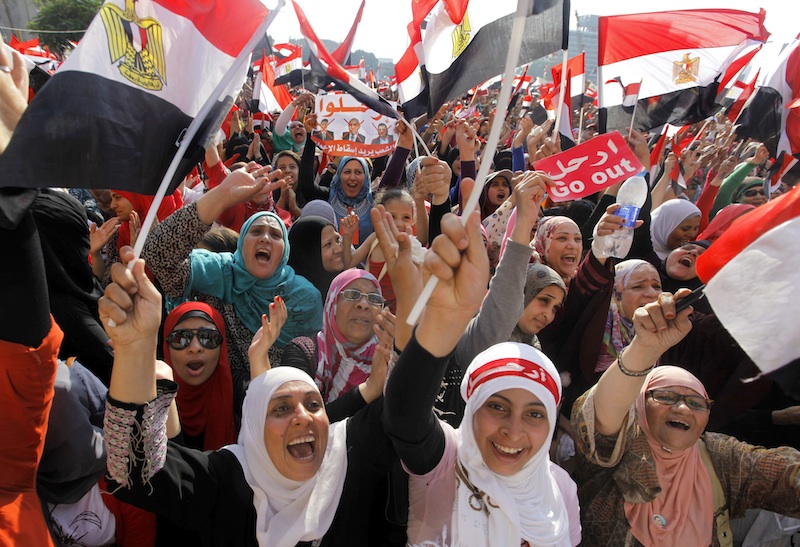Cairo (AP) — A new wave of sexual assaults by groups of men targeting women during anti-government protests in Cairo’s central Tahrir Square has been reported as millions of Egyptians take to the streets to demand President Mohammed Morsi’s ouster.
A vigilante group formed to protect women in the square, which has become the epicenter of anti-government rallies, said it recorded the highest number of attempts — 46 — on Sunday as the majority of protesters were festive as families with small children and others spilled into side streets and across boulevards, waving flags, blowing whistles and chanting.
The atmosphere became less friendly in Tahrir as night fell on the badly lit plaza, which has seen a rise in attacks against women since shortly after the 18-day revolution that forced the resignation of Morsi’s predecessor, Hosni Mubarak, in 2011. Sexual harassment has long been common in Egypt, but its increasing frequency and violence has shaken the protest movement.
A Dutch woman was assaulted by multiple men as a crowd surrounded her in Tahrir Square on Friday as weekend protests by Morsi’s supporters and opponents got underway, officials said.
The Committee to Protect Journalists said Monday that the 22-year-old woman was repatriated, referring to a statement issued by the Dutch embassy in Cairo.
A security official, speaking on condition of anonymity because he wasn’t authorized to talk to the media, said the Egyptian prosecutor’s office had launched an investigation into the attack.
Dutch media reported that the Foreign Ministry had confirmed a 22-year-old Dutch woman was assaulted on Friday night on Tahrir but given no more details. The media reports said she was apparently interning with an Egyptian organization and had gone to the square to take photos of the demonstrations.
Top presidential aide Essam el-Haddad, meanwhile, said the attack was among seven cases reported by human rights groups in or around Tahrir on Friday. “Those criminal acts do not appear to be politically motivated or controlled,” he said in a statement posted on his office’s Facebook page. The president’s office also said the attacks “appear to be a sign the crowds in Tahrir are out of control.”
Some protesters have alleged that the government has exaggerated claims of sexual assault to try to drive away female protesters and mar the movement’s reputation.
Operation Anti-Sexual Harassment/Assault, which patrols the square, said 46 group assaults were recorded Sunday in Tahrir, calling that the highest number it has encountered since the group was formed in November 2012. “Many cases were severe cases that required either psychological or medical treatment,” one member of the group, Engy Ghozlan, told The Associated Press.
The group said on its Twitter account that at least 17 attempted assaults were reported on Tahrir on Monday, and volunteers had intervened in eight of them.
An AP reporter witnessed a group of men waving wooden sticks surrounding an Egyptian woman on Sunday. She shouted at them before falling on the ground. Many of the men claimed they were trying to help the woman but they wouldn’t allow anybody to approach her and it was unclear what happened next. The reporter was not able to reach the woman and help her.
Nabil Mitry, a 35-year-old protester who also saw the attack, said the assailants were yelling insults at a man trying to help the woman. He blamed the lack of police at the square. Security forces largely stay away to avoid provoking confrontations with the protesters.
“The problem is that there is no police, so there is no security. If the police was securing the square we wouldn’t have this kind of problem”, he said.
A spokesman for Morsi’s Muslim Brotherhood, Gehad al-Haddad, urged protesters and others to support initiatives like Operation Anti-Sexual Harassment/Assault “to prevent anything from happening to citizens joining their demonstrations” in a statement posted on his Twitter account.
The group dismissed the statements Monday, saying “we don’t believe in the presidency and the Muslim Brotherhood’s sudden concern about the women’s physical integrity or their full right to protest safely, when we all know their position regarding women’s equality and rights.”
Initiatives to counter the problem have mushroomed in recent months, with groups protecting women at large protests or during national holidays when groping and harassment in crowds is at an all-time high. Activists have offered self-defense classes for women. Social network sites have been started where women can “name and shame” their harassers.
But there also are conservative religious clerics and some government officials who blame women, saying they invite harassment and sexual abuse by mixing with men.
In one of the most high-profile cases, Lara Logan, a correspondent for U.S. network CBS, was sexually assaulted and beaten in Tahrir Square at the height of the anti-Mubarak uprising. She said later that she believed she was going to die. After being rescued, Logan returned to the United States and was treated in a hospital for four days.
Copyright 2013 The Associated Press.






